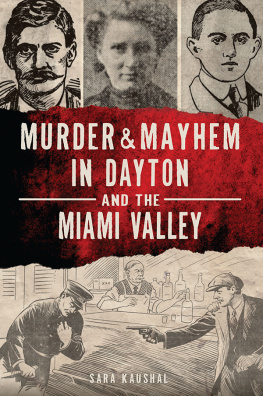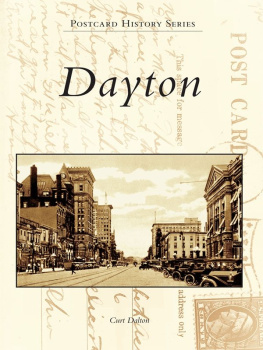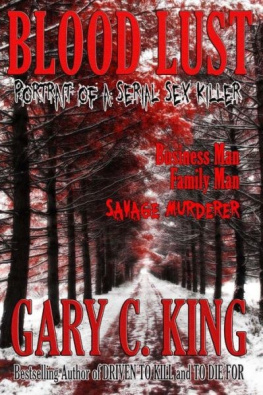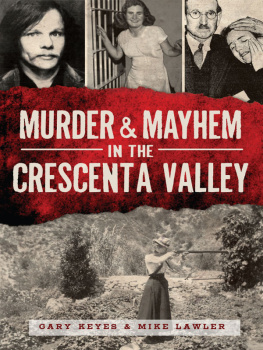

Published by The History Press
Charleston, SC
www.historypress.com
Copyright 2021 by Sara Kaushal
All rights reserved
First published 2021
e-book edition 2021
ISBN 978.1.43967.266.2
Library of Congress Control Number:2021934609
print edition ISBN 978.1.46714.413.1
Notice: The information in this book is true and complete to the best of our knowledge. It is offered without guarantee on the part of the author or The History Press. The author and The History Press disclaim all liability in connection with the use of this book.
All rights reserved. No part of this book may be reproduced or transmitted in any form whatsoever without prior written permission from the publisher except in the case of brief quotations embodied in critical articles and reviews.
This book is dedicated to my dad, who loved true crime and history.
CONTENTS
PREFACE
As a lifelong resident of the Dayton area, I grew up knowing bits and pieces of local history. You cant go to Kettering schools without learning about Charles Kettering, and you certainly cant live in the vicinity of Dayton without learning about the Wright brothers. My interest in Dayton history came from a conversation about our namesake, Jonathan Dayton.
Dayton was a Revolutionary War veteran and the youngest signer of the U.S. Constitution. I found this information fascinating and shared it with anyone who would listen. This inspired me to start my blog, Dayton Unknown. Since 2014, Dayton Unknown has shared information about the Dayton area, both historical and current. It was through the years researching and writing for this blog that I gathered enough information to write this book.
ACKNOWLEDGEMENTS
There are many people I want to thank for their help in getting me to this point. I couldnt have done this without the help of the librarians in the Dayton Room at the downtown branch of the Dayton Metro Library. Id like to also thank the Wright Library and the Xenia Community Library for providing lots of information and quiet places to work.
Many thanks to Stephen Grismer from the Dayton Police History Foundation and Andrew Walsh, author of Lost Dayton. I got a lot of helpful information from you both. To John Rodrigue of The History Press, I must have asked you about one thousand questions, all of which you answered patiently.
MOST OF ALL, ID like to thank my friends and family for their endless support and cheerleading during the past year. To my mother, I want to thank you for always being my supporter. You were the first person I told when I knew this was going to happen. Beth (any), you are the other half of Dayton Unknown and my best friend. A most special thank you to my husband, Ravi, my biggest fan and my companion on way too many Saturday trips to the library. You know all the stories almost as well as I do.
THE BALLAD OF JOHN McAFEE
John McAfee entered history in a way most people would not desire. While many achieve a name in history from deeds of great historical or political significance, McAfees name was written into history another way. McAfee achieved infamy by becoming the first person to be hanged in the young city of Dayton, Ohio, in 1825.
John McAfee was raised by his aunt and uncle for most of his childhood. His parents died when he was young. First was his mother, when he was so young that he didnt remember her. His father remarried a few years later, but then he too met a tragic fate. Andrew McAfee drowned in a sinking ship on the Susquehanna River. After this tragedy, McAfee was taken in by his fathers sister, Margaret McAfee Skelly, and her husband, Philip Skelly.
It is unclear why McAfee was so restless in life or when exactly it started. Perhaps he always had the restless spirit in him, or maybe it came later, after he lost his parents in devastating blows. Whatever the reason, McAfee desired to seek out new places and meet new people. This wanderlust led him to move from his hometown of Huntington, Pennsylvania, to the recently opened territory, the Northwest, and then ultimately Dayton, Ohio.
After settling into Dayton, McAfee married the daughter of a Dayton pioneer. Their marriage was initially a happy one, but before long, the honeymoon ended. Although a married man, McAfee was not a settled man. He stayed out all night drinking to excess and enjoying the company of fellow partiers and other rowdy locals. As his wild ways escalated, his social standing in the community dropped. Many who thought highly of him had changed their minds when they saw his outrageous behavior. As many lowered their opinion of McAfee, one stood out, noticing him in a positive lightnext-door neighbor Hetty Shoup.
Like a siren call, McAfee was drawn to her. Hetty encouraged him, thrilled by his attention. Some even theorized that she went as far as suggesting to McAfee that he could dispose of his wife for them to move their clandestine relationship into the open. Although he balked at the suggestion initially, he eventually succumbed to the pressure.
Mrs. McAfee had taken to her bed in illness in May 1824. For several weeks, she remained in bed, too weak to care for herself and their infant daughter. When her husband brought her an elixir he said would make her feel better, she was all too willing to drink it. Unfortunately for Mrs. McAfee, the elixir was not intended to make her well but instead to poison her. As she lay in her bed next to their infant daughter, she slowly succumbed to the poison. Impatient, McAfee decided she wasnt dying fast enough. To speed things along, he strangled her in the bed they shared, next to the daughter they created. When the deed was done, he experienced instant regret for his actions and even an intense dislike for Hetty Shoup. At the thought of his behavior and Hetty, he recoiled and fled the house.
Hours later, a neighbor of the McAfees came to check on her condition and discovered her lifeless body. Next to her body on the bed was her crying infant daughter. The neighbor ran to Magistrate Heck for help, and immediately, the town started its search for McAfee. The search was not successful though; McAfee was nowhere to be found.
Days later, McAfee resurfaced at his wifes funeral. During the service, as the preacher was giving his sermon, McAfee appeared. Magistrate Heck whispered to the preacher to cut his service short. Once it ended, McAfee was apprehended. With the assistance of two other men attending the services, Heck tied McAfee with the rope they used to lower his dead wifes coffin into the ground.
The grand jury took no time indicting McAfee for murder in the first degree. The criminal trial was speedy as well, with a guilty verdict returned after a very brief deliberation. On the charge of murder in the first degree, the penalty was death by hanging. With the public sentiment so negative and angry toward McAfee, officials decided not to take a long period of time to carry out the sentence. A crude scaffolding was built, and in late March 1825, Daytons first hanging was carried out. People from all over Dayton attended the hanging, some spectators even traveling overnight from nearby cities to witness the spectacle. Among the crowd of spectators stood Hetty Shoup, the vixen who had so tempted McAfee just months before. If she felt anything about the scene unfolding before her, her expression did not give it away. To anyone who didnt know the story, she appeared to be just another onlooker in the crowd.
Next page














